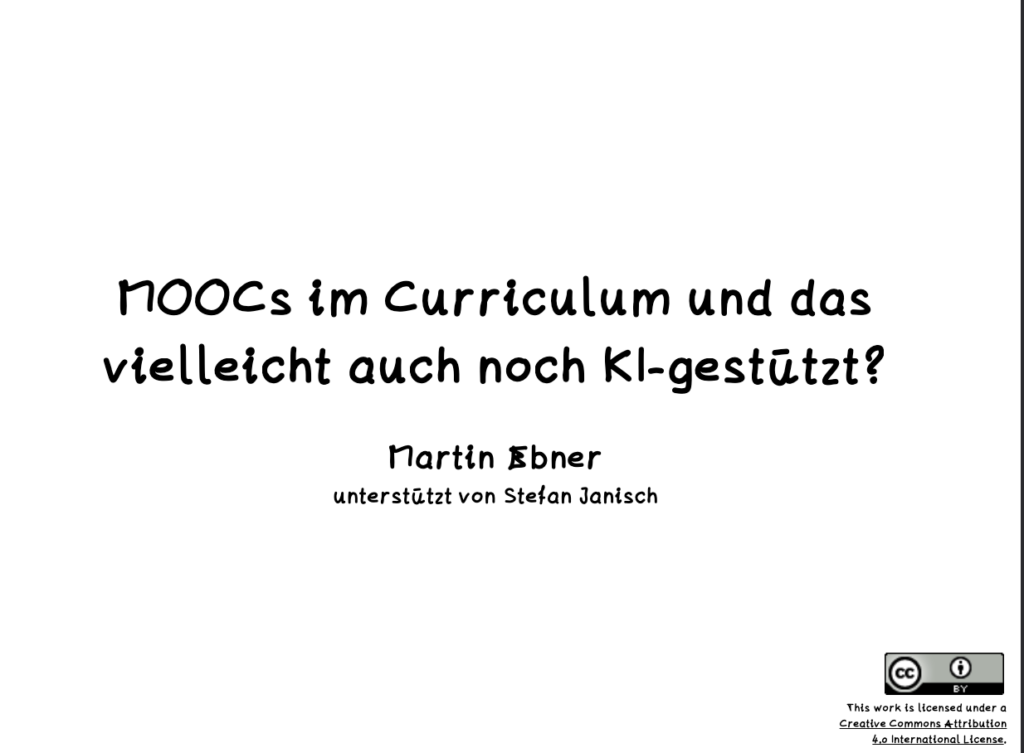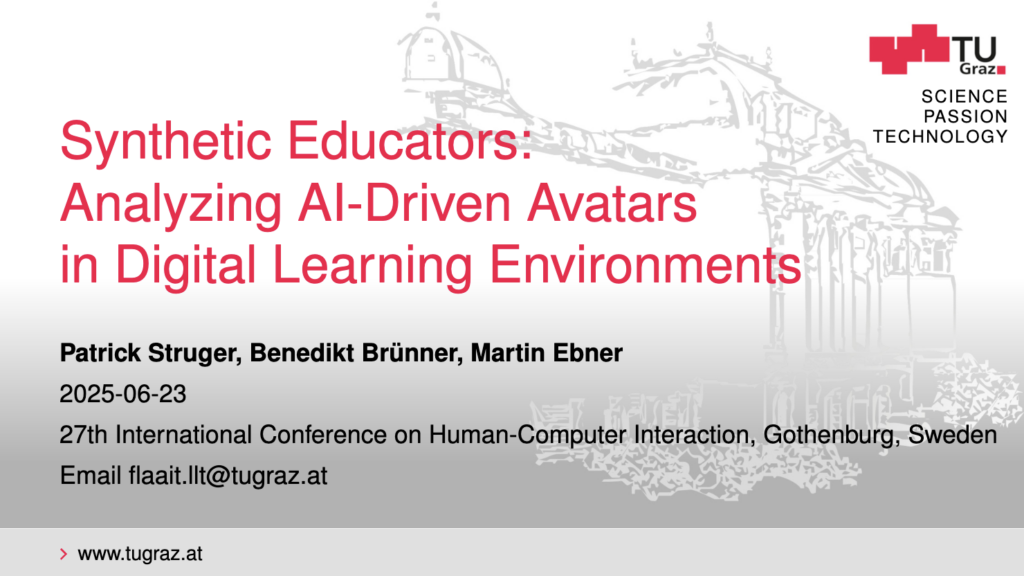Im Rahmen der Veranstaltung „Curricula entwickeln mit KI und anderen Tools“ von e-Teaching.org durfte ich einen Workshop zu „MOOCs im Curriculum und das vielleicht auch noch KI-gestützt?“ gestalten. Hier gibt es noch meine Folien nachgereicht:


Digitale Lehre an und rund um der Technischen Universität Graz
Im Rahmen der Veranstaltung „Curricula entwickeln mit KI und anderen Tools“ von e-Teaching.org durfte ich einen Workshop zu „MOOCs im Curriculum und das vielleicht auch noch KI-gestützt?“ gestalten. Hier gibt es noch meine Folien nachgereicht:

Our publication about „Implementing Multilingual MOOCs in European University Alliances with the Help of AI Usage, LTI and Open Licenses: Technical and Organizational Challenges“ is now online available.
Abstract:
Producing and delivering MOOCs within European university alliances presents technical, organizational, and licensing challenges, particularly regarding multilingual accessibility, interoperability, and platform integration. This paper examines these challenges through a case study of the “Open Educational Resources in Higher Education” MOOC, developed with all partner institutions of the Unite! university alliance. The course was produced in all official alliance languages and used AI-driven tools (HeyGen) to generate multilingual instructor avatars for efficient localization. A key aspect of this MOOC was its open licensing approach. By adopting a Creative Commons (CC BY 4.0) license, the course materials were designed for reuse and dissemination across different educational contexts. To ensure broad accessibility, the MOOC was made available on the Austrian national MOOC platform iMooX.at and embedded within Unite! Metacampus, the alliance’s federated LMS. For this, Learning Tools Interoperability (LTI) for cross-platform interactions was used. Through LTI, course activities and materials on iMooX.at were linked to Metacampus, allowing users to access materials, track progress, and interact within a unified learning environment. This strategy supported federated access and engagement across institutional systems. This paper outlines the technical and organizational strategies used in developing the MOOC, discussing key challenges and providing recommendations for openly licensed, AI-supported, and LTI-integrated MOOCs within European university alliances. The findings contribute to a deeper understanding of structuring cross-institutional MOOCs that are pedagogically, technologically, and organizationally sustainable while advancing open education principles in higher education.
[full article @ publisher’s homepage]
[full article @ ResearchGate]
Reference: Ebner, M., Schön, S., Gasplmayr, K., Taraghi, B. (2026). Implementing Multilingual MOOCs in European University Alliances with the Help of AI Usage, LTI and Open Licenses: Technical and Organizational Challenges. In: Hamonic, E., Sharrock, R. (eds) Digital Education: Shaping Sustainable Lifelong Learning for All in the Era of AI. EMOOCS 2025. Lecture Notes in Computer Science, vol 15733. Springer, Cham. https://doi.org/10.1007/978-3-032-00056-9_15
This is an impactful contributions, methodological rigor, and exceptional novelty in the research field of AI in education.
I was invited to the „10th European Open and Digital Learning Week (EODLW) 2025“ to give a talk within the workshop „MOOCs in the era of AI“, which will take place on Thursday, November 27, 2025.
So, I will be thrilled if you attend our talks. Mine will be about „AI avatars and their application in MOOCs„.
Es freut uns, dass der Standard unsere neuesten Ergebnisse im Bereich KI und Avatare aufgegriffen hat und einen kleinen Beitrag mit dem Titel „KI als Lehrer“ abgedruckt hat in der Ausgabe vom 17.09.205
Künstliche Intelligenz und Avatare in der Lehre haben den Standard beschäftigt. Die Zeitung hat darüber mit Sandra Schön von der Organisationseinheit Lehr- und Lerntechnologien gesprochen, wo ein Team untersucht hat, wie sich schulischer, aber auch universitärer Unterricht mithilfe digitaler Methoden sowie mit und durch KI gestalten lässt.
Wer sich gerne ein Bild davon machen möchte, wie die Avatare umgesetzt sind, ist herzlich eingeladen sich jederzeit kostenlos in diesen MOOC einzuschreiben: Open Educational Resources in Higher Education
This is an impactful contributions, methodological rigor, and exceptional novelty in the research field of AI in education.
Our publication „Synthetic Educators: Analyzing AI-Driven Avatars in Digital Learning Environments“ at this year’s HCII conference is published.
Abstract:
Videos can be used in a variety of ways in learning environments today. With advances in generative AI technologies, tools such as HeyGen and ElevenLabs make it easy to create synthetic teachers, promising efficiency and accessibility. This study investigates the impact of AI-generated teaching video avatars on learners‘ emotional responses. A mixed-method approach was adopted, in which 55 participants were shown AI-generated videos and videos with real instructors. Emotional engagement was measured using FaceReader Online, along with quiz questions and follow-up interviews to gauge knowledge retention and perceptions of this educational technology. Results indicate that AI avatars effectively convey content and weakly elicit better recall rates and positive emotional responses comparable to those of real instructors. However, concerns were raised about emotional authenticity and engagement, highlighting the need for improved avatar design. The study concludes with a discussion of the potential and limitations of AI avatars and argues for their thoughtful integration to improve educational equity and learning outcomes.
[full article @ publisher’s homepage]
[draft @ researchgate]
Reference: Struger, P., Brünner, B., Ebner, M. (2025). Synthetic Educators: Analyzing AI-Driven Avatars in Digital Learning Environments. In: Smith, B.K., Borge, M. (eds) Learning and Collaboration Technologies. HCII 2025. Lecture Notes in Computer Science, vol 15807. Springer, Cham. https://doi.org/10.1007/978-3-031-93567-1_13
This is an impactful contributions, methodological rigor, and exceptional novelty in the research field of AI in education.
Our publication about our OER-MOOC titled „A multilingual OER MOOC: A case study on production and usage in a university cooperation“ is now published.
Abstract:
This paper investigates the processes, outcomes, and impact of the Unite! OER Courses Project, a cross-university initiative aimed at promoting Open Educational Resources (OER) across nine European higher education institutions. Aligned with UNESCO’s OER recommendations and the Open Science movement, the project sought to enhance accessibility to high-quality educational materials and foster digital competencies among both educators and students. The research adopts a qualitative case study approach, leveraging project reports and feedback from partners. Through the development of a multilingual massive open online course (MOOC) and an international OER course, the project addressed several core goals, including support for Open Science competencies and the advancement of digital literacy across Europe. The MOOC, launched in May 2024, attracted over 1,400 participants, exceeding initial targets and demonstrating the growing demand for accessible OER content. Furthermore, capacity-building workshops aimed at educators provided training on how to incorporate OER. Initial findings indicate that the project successfully developed and disseminated several OER materials, including a multilingual MOOC and additional resources translated into Turkish, Indonesian, and Arabic. The project also fostered capacity-building among partner institutions, enabling broader engagement with OER practices. Participants in the MOOC and related activities have also reported a significant increase in their competencies regarding OER and Open Science. This study underscores the value of cross-institutional collaboration and the potential of OER to enhance radical creativity, educational accessibility, and innovation in higher education.
[article @ ResearchGate]
[article @ Journal’s Homepage]
Reference: Schön, S., Ebner, M., Hohla-Sejkora, K., Keller, E., Rapp, A., Ribeiro, M. H., Segradin, R., & Vicente-Saez, R. (2025). A multilingual OER MOOC: A case study on production and usage in a university cooperation. Journal of Open, Distance, and Digital Education, 2(1), 1-16. https://doi.org/10.25619/y956n017
Our research about AI-Driven Avatars was presented at 27th International Conference on Human-Computer Interaction, Gothenburg, Sweden.

Struger, P., Brünner, B., & Ebner, M. (2025, Juni 23). Presentation: Synthetic Educators: Analyzing AI-Driven Avatars in Digital Learning Environments. Graz University of Technology. https://doi.org/10.3217/bngt5-p2053
This is an impactful contributions, methodological rigor, and exceptional novelty in the research field of AI in education.
Our chapter in the new book on Emerging Technologies, „Early Findings from Pilots in AI-Driven Education: Effects of AI-Generated Courses and Videos on Learning and Teaching,“ has been published.
Abstract:
This paper presents the (preliminary) findings from three pilot activities conducted at TU Graz over the past 18 months, exploring the use of AI in generating (open) educational resources. The first pilot involved developing a MOOC titled “Societech: Society in the Context of Information Technologies”, which utilized various AI tools to create videos and learning materials, engaging over 500 participants. The second pilot focused on creating multilingual videos for the MOOC “Open Educational Resources in Higher Education”, using AI-generated avatars of course instructors, involving more than 800 participants. The third pilot was a field study conducted in an Austrian secondary school, where 20 students aged 12–15 could choose between videos featuring their teacher, an AI-generated human avatar, or a cartoon character. Preliminary results indicate a clear preference for teacher-led videos, highlighting the significant role of the teacher in the learning process. While AI tools facilitated quicker and more cost-effective production of educational resources, challenges such as the need for quality assurance and handling of (now possible) automatic translations were noted.
[draft @ ResearchGate]
[full version @ publisher’s website]
Reference: Schön, S., Brünner, B., Ebner, M., Edelsbrunner, S., Hohla-Sejkora, K., Uhl, B. (2025). Early Findings from Pilots in AI-Driven Education: Effects of AI-Generated Courses and Videos on Learning and Teaching. In: Auer, M.E., May, D. (eds) 2024 Yearbook Emerging Technologies in Learning. Learning and Analytics in Intelligent Systems, vol 44. Springer, Cham. https://doi.org/10.1007/978-3-031-80388-8_2
At this year’s EDMedia conference, we published a publication titled „Rapid Multilingual Video Production utilizing Artificial Intelligence„.
Abstract:
This study presents the Rapid Multilingual Video Production (RMVPro) framework, an optimized process for creating high-quality multilingual educational videos using artificial intelligence (AI). The framework involves three stages: planning, translation, and production, with each stage involving iterative feedback loops with experts and native speakers to ensure linguistic and cultural accuracy of the translations. The framework for the Multilingual Video Sprint was tested during an international conference and the produced multilingual videos showing an AI human avatar were evaluated in a MOOC with feedback from 128 students. Results showed that AI could be utilized to accelerate video production while maintaining the clarity and comprehensibility of educational content. However, feedback indicated mixed perceptions of AI-generated human avatars, with some students preferring human facilitators for reasons of authenticity. The use of AI avatars in multilingual educational videos must be implemented carefully, but the RMVPro framework ensures high quality while utilizing the potential of AI to rapidly produce multilingual educational videos.
[draft @ researchgate]
[full version @ conference website]
Reference: Brünner, B. & Ebner, M. (2025). Rapid Multilingual Video Production utilizing Artificial Intelligence. In T. Bastiaens (Ed.), Proceedings of EdMedia + Innovate Learning (pp. 1223-1230). Barcelona, Spain: Association for the Advancement of Computing in Education (AACE). Retrieved May 28, 2025 from https://www.learntechlib.org/primary/p/226280/.
Wir haben wieder etwas mit „meinem“ Avatar herumgespielt und ein Video erstellt rund um das Thema „Digitale Bildung“. Das gibt es nun in zwei Versionen – deutsch und englisch. Vielleicht ist es ja auch in anderen Kontexten hilfreich, freu mich wie immer auf Rückmeldungen.